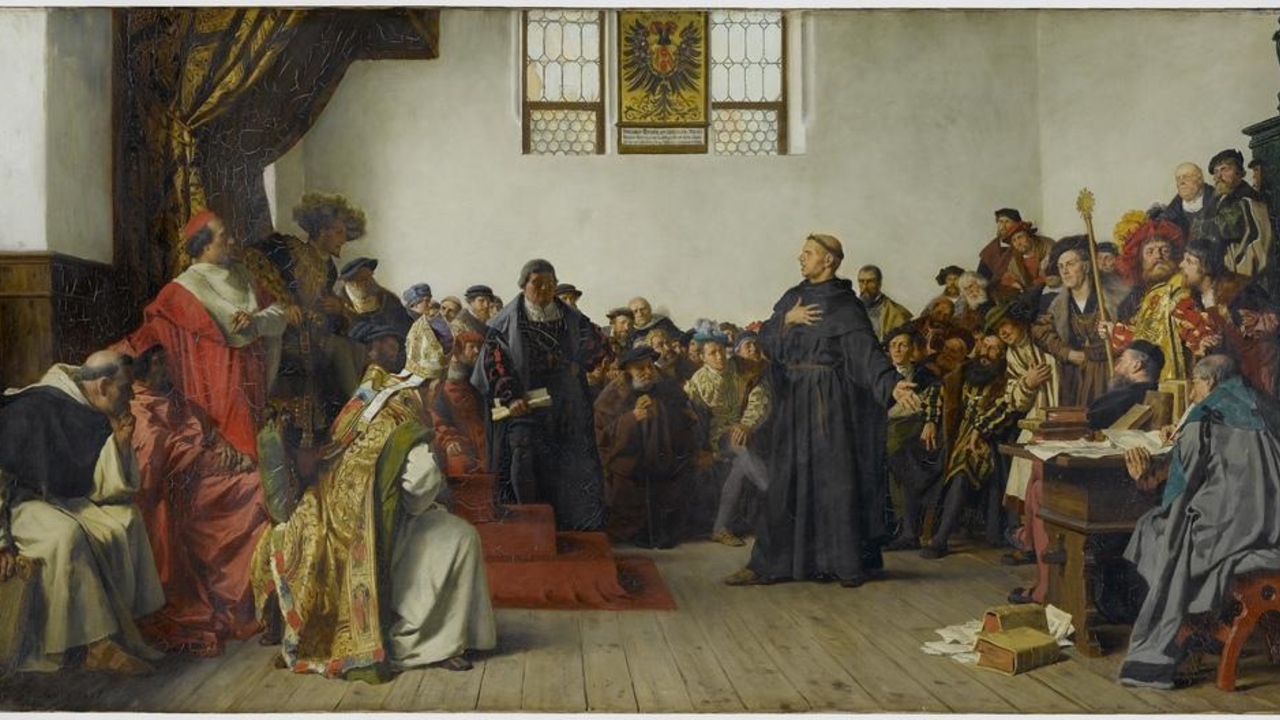
Why The Reformation Was Great And I’m Not Ashamed to Say It
If endless sequels teach us anything, it’s that the longer something continues, the more likely it is to devolve into a pale imitation of its former glory. Sure, sometimes you get a Rocky IV (a perfect movie), but more often you end up with a Superman IV situation (which is redeemable only by being slightly better than Superman III). The passage of time almost always tends toward decline, especially when there’s an unwillingness to recognize that things are beginning to go off the rails. Without someone to stand up and say, “Hey, why would you hire Richard Pryor for a Superman movie?” the march toward collapse is, unfortunately, inevitable.
This is why Martin Luther is such an important figure in church history. Not because he was the first to stand up and say something was wrong in the Church, and not because he got everything right. But because his stand captured the attention of a world that had long seen the devolution of the Church and had either been unwilling or unable to say anything.
It was obvious to many that the time leading up to Luther’s stand was a period in which the Church had taken many wrong turns and needed to repent. Some men had made great stands before him, notably John Wycliffe and Jan Hus in the 14th and 15th centuries respectively. But for reasons only God knows, Luther had a particular ability to spark the fire of Reformation in a way that would impact the entire Christian world.
Luther's stand was right, important, and necessary. It took courage. He was an imperfect person, and I disagree with some of the things he said and did, but his fight was good and worthy of celebration.
What Lit Luther’s Fire?
To understand Luther, we need to understand the time in which he lived. His main issue with the Church was the sale of indulgences, which he considered nothing short of spiritual extortion. Often, when people read the ‘95 Theses’, they are surprised—they don’t contain a treatise on later Reformation doctrines like justification by faith alone or the sufficiency of Scripture. Instead, they are arguments against the sale of indulgences.
Pope Leo X had authorized the sale of indulgences to raise funds for the construction of St. Peter’s Basilica in Rome. The Church employed men to sell these indulgences and collect the money. Most notable among them was Johann Tetzel, a powerful speaker with an enticing sales pitch. His famous line, “When a coin in the coffer rings, a soul from purgatory springs,” is a paraphrase of his message, and many believed it.
What Is An Indulgence?
According to Indulgentiarum Doctrina, an indulgence is defined as:
“...a remission before God of the temporal punishment due to sins whose guilt has already been forgiven, which the faithful Christian who is duly disposed gains under certain defined conditions through the Church’s help when, as a minister of redemption, she dispenses and applies with authority the treasury of the satisfactions won by Christ and the saints.”
In Catholic teaching, indulgences deal not with the guilt of sin, which has already been forgiven, but with the punishment that has not yet been satisfied. An indulgence, then, does not forgive sin but removes the temporal punishment that would otherwise be experienced in purgatory. In Roman Catholic theology, purgatory is where souls go after death to atone for sins committed during their lifetimes before they can enter heaven. Therefore, indulgences lessen one’s time in purgatory, but they do not provide forgiveness.
One might think indulgences are a relic of medieval times, but they remain an active part of Catholic teaching. According to Catholic Answers, “Indulgences are part of the Church’s infallible teaching. This means that no Catholic is at liberty to disbelieve in them. The Council of Trent stated that it ‘condemns with anathema those who say that indulgences are useless or that the Church does not have the power to grant them.’” As recently as 2013, Pope Francis offered indulgences to Catholics who followed his Twitter account, though with Elon Musk now in charge, he might be less enthusiastic about the platform.
Luther’s 95 Arguments
Luther saw the sale of indulgences as the ultimate injustice against God’s people, so he penned 95 arguments condemning the false teaching. Among them were the following:
27: "They preach only human doctrines who say that as soon as the money clinks into the money chest, the soul flies out of purgatory."
28: "It is certain that when money clinks in the money chest, greed and avarice can be increased; but when the Church intercedes, the result is in God’s hands alone."
32: "Those who believe they can be certain of their salvation because they have indulgence letters will be eternally damned, along with their teachers."
36: "Any truly repentant Christian has a right to full remission of penalty and guilt, even without indulgence letters."
86: "Why does the pope, whose wealth is now greater than the wealth of the richest Crassus, not build the basilica of St. Peter with his own money rather than with the money of poor believers?"
The Response
As expected, Luther’s arguments were not warmly received by Church authorities. In 1520, a papal bull (what you might call a ‘decree’) was issued demanding that Luther recant. In it, the pope compared Luther to a "wild boar" that had invaded God's vineyard. Luther was given 120 days to comply.
Then in 1521, an imperial gathering (a Diet) was convened in Worms to deal with Luther. Luther began his journey to Worms on April 2, 1521. Upon arriving, he was commanded to recant his teachings. In his first appearance, he requested time to deliberate. At his second appearance, Luther made a declaration that has since become one of the most famous stands for truth in Christian history:
"Unless I am convinced by the testimony of Scripture or by clear reason—for I trust neither pope nor council alone, since it is well known that they have often erred and contradicted themselves—I am bound by the Scriptures I have cited, for my conscience is captive to the Word of God. I cannot and will not recant anything, for to act against one's conscience is neither safe nor right. Here I stand, I can do no other. May God help me."
The next day, the 19-year-old Emperor Charles V declared Luther a notorious heretic and approved of his condemnation, effectively placing a death sentence on him and ordering his writings to be burned. However, Luther was saved by his friend Frederick, who staged a kidnapping and hid him in Wartburg Castle, where Luther spent a year translating the Bible into German.
Luther’s teachings spread and had a profound influence across Germany and Europe. In 1525, in another act of defiance, Luther married Katharina von Bora, a former nun. Together they opened their home to students who came to learn about Luther's reforms.
Why Celebrate?
Some today argue that the Reformation brought division and strife to the Church, and therefore should not be celebrated. Notable Roman Catholic commentator Matt Walsh once tweeted, "The Church is fractured into a million pieces. Christians disagree about almost everything. Even if you dislike the Catholic Church, it seems odd for any Christian to gleefully celebrate Reformation Day. You're celebrating disunity and brokenness, like throwing a divorce party."
But we are not celebrating disunity—we are celebrating recovery. The recovery of truth and the exposure of error. This is what the Reformation was all about. The Roman Catholic Church had fallen into error in many areas, indulgences being just one. The reformers saw themselves not as divisive figures, but as men seeking to give God’s people back what had been taken from them: the simple Gospel message of salvation by grace alone, through faith alone, in Christ alone, according to Scripture alone, and for God’s glory alone. These five battle cries (The Five Solas) encapsulated the reformers' cause and are worth celebrating.
